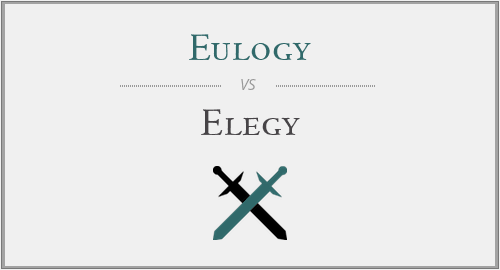Eulogy vs. Elegy: Navigating Expressions of Remembrance
When it comes to expressing words of remembrance or honoring the deceased, the terms "eulogy" and "elegy" are often used. However, they serve distinct purposes and convey different forms of commemoration. This article aims to clarify the distinctions between "eulogy" and "elegy," shedding light on their meanings, applications, and appropriate usage in various contexts.
Correct Usage:
Eulogy:
"Eulogy" is a noun used to describe a speech or piece of writing that praises and commemorates a person, typically delivered at a funeral or memorial service. It focuses on celebrating the life, achievements, and positive qualities of the deceased.
Elegy:
"Elegy" is also a noun used to describe a poem or song that expresses feelings of lament, sorrow, or reflection, often dedicated to someone who has passed away. Elegies are a form of artistic expression that captures the emotional aspects of loss and mourning.
Meanings and Applications:
Eulogy:
Use "eulogy" when referring to a spoken or written tribute that celebrates the life and accomplishments of an individual. Eulogies are typically delivered at memorial services or funerals and focus on positive aspects of the person's character.
Elegy:
Use "elegy" when referring to a poem, song, or other artistic work that expresses grief, sorrow, or reflection on the themes of mortality and loss. Elegies capture the emotional nuances associated with the experience of mourning.

Examples:
Correct: The family members shared heartfelt eulogies that highlighted the deceased's generosity and kindness.
Correct: The poet wrote a beautiful elegy that expressed the profound sadness of losing a loved one.
Focus and Artistic Expression:
Consider the focus of the commemoration when choosing between "eulogy" and "elegy." Eulogies center on positive aspects of the individual's life, while elegies are artistic expressions of mourning and reflection.
Conclusion:
Navigating the distinctions between "eulogy" and "elegy" allows for precise and meaningful communication when expressing condolences or commemorating the departed. Whether celebrating a life through spoken words or capturing the emotional depth through artistic expression, choosing the correct term enhances the expression of remembrance.




Have a discussion about this article with the community:
Report Comment
We're doing our best to make sure our content is useful, accurate and safe.
If by any chance you spot an inappropriate comment while navigating through our website please use this form to let us know, and we'll take care of it shortly.
Attachment
You need to be logged in to favorite.
Log In